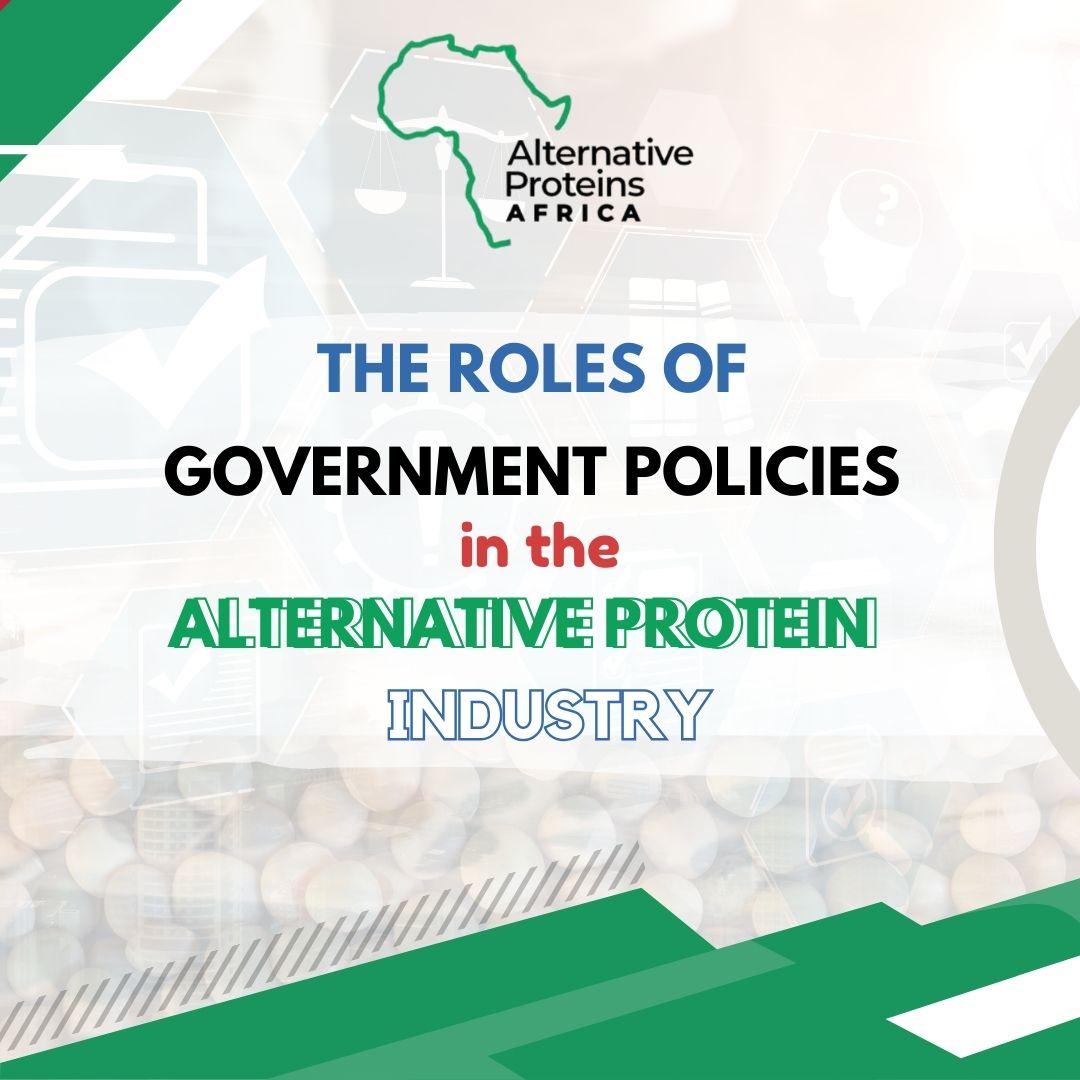
Introduction
In the changing nutritional landscape in Africa and globally, alternative proteins are taking centre stage. This central attention comes at a crucial time when a significant shift in how we produce, consume, and view protein is necessary. This is because of the need for more sustainable, ethical, and healthier alternatives to animal-based proteins. However, as the alternative protein industry gains momentum, policies made by the government play an important role. Accommodating and enabling policy initiatives have a way of promoting a more resilient and blossoming protein ecosystem. While contrarily, hostile policies can impede the growth of the industry.
What are the critical roles of Government Policies?
Policies are essential in informing and influencing the behaviour and decisions of stakeholders (communities, organizations, or individuals) within a particular context. Government Policies are guidelines, regulations, and courses of action designed and adopted by a government and other political actors to address an identified situation. As with other industries, the thriving of the alternative protein industry depends on how accommodating the government policies are.
So far, the power of government policies in influencing the industry’s growth has been brought to the fore in the global market. In June last year, the United States government approved the sales of cultured meat within the country. This event changed the trajectory of alternative proteins, especially within the country, because they can now sell this meat alternative. In a somewhat contrary situation, Italy’s parliament, in November, gave final approval to ban the production, sales, consumption, export, and import of cultivated meat within the country. Consequently, erring production factories and businesses are to face heavy sanctioning.
In these two opposing scenarios, it is evident that government regulatory policies play a significant role in determining the future of alternative proteins. Fair public support and an enabling policy system ensure that alternative proteins better serve their purpose. That is, creating a resilient food system that promotes sustainable, healthier, and ethical practices.
A typical example of an enabling government policy paving the way is Singapore’s 30 by 30 goal. This goal aims to produce 30% of the country’s nutritional needs by 2030, achieving it with less than 1 % of land earmarked for farming. Little wonder the country was the first to approve the sales of cultured meat in 2020, thus fostering the growth of the alternative protein industry. Here is an example from which the African continent can learn. Implementing result-oriented, sustainability-inclined, and locally-driven food system policies will promote our core values as a people while also ensuring that we meet our nutritional needs in the best possible way.
What should we do?
We need a swift transformation in our food landscape, but we must understand that this journey is not usually a walk in the park. For this to happen, several factors must be considered. One of such is the role of government policies in guiding what food we produce and how we produce them.
Some governments, especially the Global North, are adopting policies that foster the development of alternative proteins. African policymakers thus need to invest in alternative protein-promoting, evidence-based policies. Such policies include those that promote public and private sector investments, collaboration, ethical raw material sourcing, and financial incentives. The reality is staring at us all! Globally, the agrifood system contributes over 30% of all emissions. Our current food systems use more than two-thirds of fresh water. They also contribute to biodiversity loss due to actions like deforestation, and are a leading emitter of methane. It thus behoves that the necessary actors take suitable measures to protect our environment, its depleting resources, and indeed ourselves.
Without mincing words, a good starting point for implementing suitable measures is the development of the right policy framework. A good policy framework is a proper guide for decision-making with a clear purpose and objectives within a defined scope. It must also involve relevant stakeholders and comply with the existing laws and regulations.
Additionally, ensuring the adoption of the developed policies is of great importance. The essence of a robust policy system lies in its implementation. And, of truth, the life of any well-meaning public policy is lived out only when commensurate actions are taken. So, yes, government policies must support the thriving of the alternative protein sector. However, the appropriate agencies and institutions of government must likewise ensure that these policies are well implemented .
Conclusion
Government policies are pivotal to shaping the alternative protein industry. Policymakers have a crucial role in creating an equitable and sustainable food landscape in the face of our numerous concerns. Collaboration amongst policy influencers, policymakers, and other stakeholders is needed to develop an effective policy system to shape the alternative protein industry into a prosperous future. Notably, the call for an encouraging policy system for the industry is not a mediocrity call where substandard products proliferate. Instead, it ensures a level playing ground where the industry can thrive healthily.

